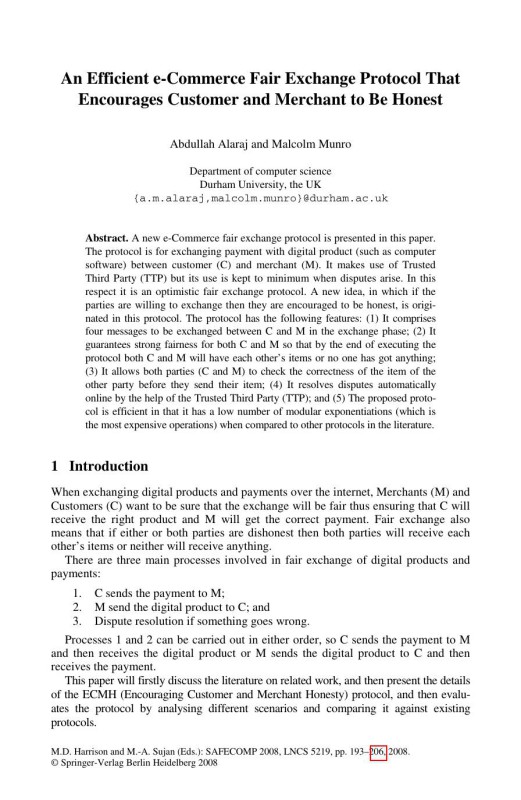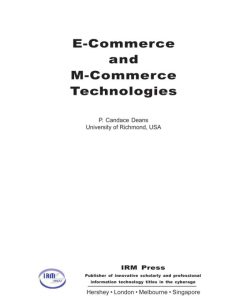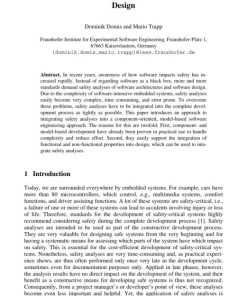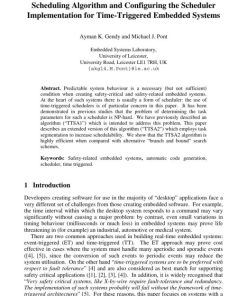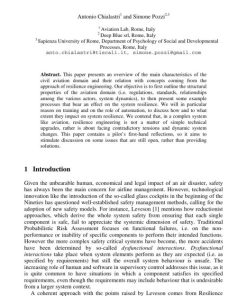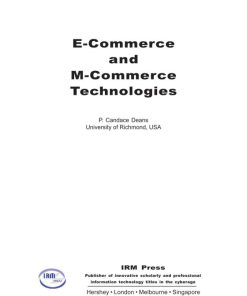An Efficient e Commerce Fair Exchange Protocol That Encourages Customer and Merchant to Be Honest 1st edition by Abdullah Alaraj, Malcolm Munro ISBN 3540876977 9783540876977
$50.00 Original price was: $50.00.$25.00Current price is: $25.00.
Authors:Abdullah Alaraj; Malcolm Munro , Tags:Computer Safety; Reliability; and Security , Author sort:Alaraj, Abdullah & Munro, Malcolm , Languages:Languages:eng , Comments:Comments:Computer Safety, Reliability, and Security
An Efficient e-Commerce Fair Exchange Protocol That Encourages Customer and Merchant to Be Honest 1st edition by Abdullah Alaraj, Malcolm Munro – Ebook PDF Instant Download/Delivery. 3540876977, 978-3540876977
Full download An Efficient e-Commerce Fair Exchange Protocol That Encourages Customer and Merchant to Be Honest 1st Edition after payment
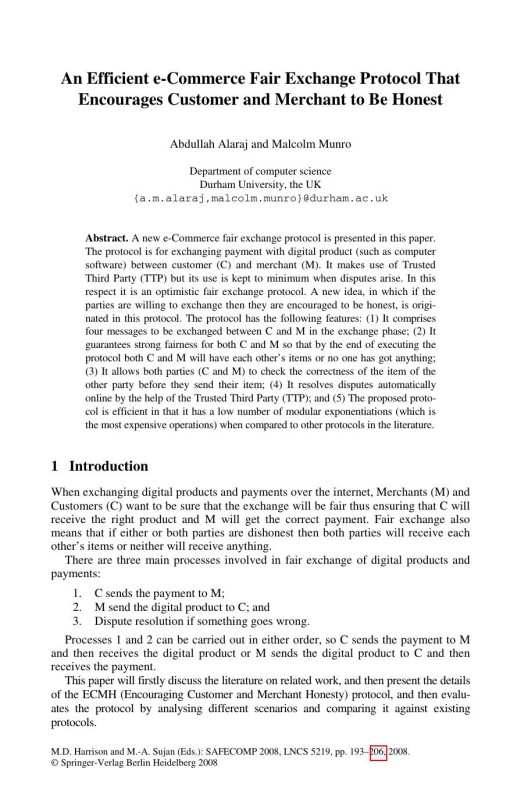
Product details:
ISBN 10: 3540876977
ISBN 13: 978-3540876977
Author: Abdullah Alaraj, Malcolm Munro
A new e-Commerce fair exchange protocol is presented in this paper. The protocol is for exchanging payment with digital product (such as computer software) between customer (C) and merchant (M). It makes use of Trusted Third Party (TTP) but its use is kept to minimum when disputes arise. In this respect it is an optimistic fair exchange protocol. A new idea, in which if the parties are willing to exchange then they are encouraged to be honest, is originated in this protocol. The protocol has the following features: (1) It comprises four messages to be exchanged between C and M in the exchange phase; (2) It guarantees strong fairness for both C and M so that by the end of executing the protocol both C and M will have each other’s items or no one has got anything; (3) It allows both parties (C and M) to check the correctness of the item of the other party before they send their item; (4) It resolves disputes automatically online by the help of the Trusted Third Party (TTP); and (5) The proposed protocol is efficient in that it has a low number of modular exponentiations (which is the most expensive operations) when compared to other protocols in the literature.
An Efficient e-Commerce Fair Exchange Protocol That Encourages Customer and Merchant to Be Honest 1st Table of contents:
Introduction
- Overview of e-Commerce and its Challenges
- The Need for Fair Exchange Protocols in e-Commerce
- Motivation for Ensuring Honesty in Customer-Merchant Interactions
- Objectives and Structure of the Paper
Background and Related Work
- Overview of Fair Exchange Protocols
- Key Concepts in e-Commerce Security
- Existing Fair Exchange Protocols and Their Limitations
- Trust and Reputation Models in e-Commerce
- Related Work on Encouraging Honesty in Online Transactions
Fair Exchange Problem in e-Commerce
- Definition of the Fair Exchange Problem
- Trust Issues Between Customers and Merchants
- Requirements of a Fair Exchange Protocol
- Security Requirements: Confidentiality, Integrity, and Authenticity
- The Role of Cryptography in Fair Exchange
Proposed e-Commerce Fair Exchange Protocol
- Design Goals and Assumptions
- Key Components of the Protocol
- Step-by-Step Description of the Protocol
- Cryptographic Techniques Used in the Protocol
- Ensuring Fairness in Transaction Execution
Encouraging Honesty in Customer and Merchant
- Motivation for Honesty: Incentives and Penalties
- Techniques for Deterrence of Malicious Behavior
- Reputation Systems and Trust Management
- Fairness Guarantees for Both Parties
- Mechanisms to Promote Cooperation and Reduce Fraud
Protocol Analysis and Evaluation
- Security Analysis: Confidentiality, Integrity, and Fairness
- Performance Evaluation: Time Complexity and Efficiency
- Comparative Analysis with Existing Protocols
- Simulation Results and Case Studies
- Scalability and Practical Considerations
Applications in Real-World e-Commerce Systems
- Integration with Existing E-Commerce Platforms
- Use Cases: Digital Goods, Service Purchases, and More
- Application in Peer-to-Peer Transactions
- Practical Challenges in Implementing Fair Exchange
Future Directions and Improvements
- Extending the Protocol to Mobile and IoT Platforms
- Enhancing Trust Models and Reputation Systems
- Addressing New Threats and Attacks in E-Commerce
- Integration with Blockchain and Smart Contracts for Further Security
- Adaptive Mechanisms for Dynamic Market Environments
Conclusion
- Summary of Contributions and Findings
- Practical Impact on E-Commerce Security and Fairness
- Final Thoughts on Enhancing Customer-Merchant Relationships
People also search for An Efficient e-Commerce Fair Exchange Protocol That Encourages Customer and Merchant to Be Honest 1st:
an efficient market lacks
an ecommerce website offers fewer models
benefits of e-commerce include the following (more than 1 answer)
farfetch e-concessions
e-commerce failure examples
You may also like…
eBook PDF
E commerce and M commerce Technologies 1st Edition by P Candace Deans ISBN 1591402395 9781591402398
eBook EPUB
Get Different Marketing That Can Be Ignored 1st edition by Mike Michalowicz 9780593330647 0593330641
eBook PDF
E commerce and M commerce Technologies 1st Edition by P Candace Deans ISBN 1591402395 9781591402398

